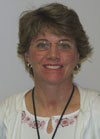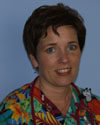Nurses strive for healthy work environment
In order for the MUSC Medical Center to earn national Magnet status for nursing excellence from the American Nurses Credentialing Center, writers of MUSC’s application must provide unit and organizational examples of excellence.These examples show how MUSC strives to support a healthy work environment, healthy nurses, and healthy patient outcomes necessary to achieve magnet status.
Blood Pressure Measurement in Pediatric Ambulatory
Care
(Rosemarie Battalgia, R.N., Pediatric Ambulatory Care)
 Rosemarie
Battalgia
Rosemarie
Battalgia
“This was a department driven project to improve the reliability of blood pressure values in pediatric patients. The goal was to improve the accuracy of reported blood pressures in pediatric ambulatory care so that 90 percent of the time, the documentation included side, site, cuff size, position and disposition of the child. Another goal was to improve accuracy so that 90 percent of the time a blood pressure value was in the 90th percentile or higher, it would be re-taken.
Phase two has begun with the full support of the Pediatric Ambulatory Counsel, the department chair, nursing leadership, and nursing staff and will incorporate the standards defined in the Fourth Report on the Diagnosis, Treatment and Evaluation of High Blood Pressure in Children and Adolescents (Pediatrics, August 2004). This BP initiative is a collaborative effort between nursing and the medical care team to collect and document accurate blood pressure data to improve the quality of decision-making and treatments for children with high blood pressure. The initiative resulted in improved decision making and treatments for children with high blood pressure values.”
Pediatric Intensive Care Unit Visitation Policy
(Melinda Biller, R.N., PICU)
 Melinda
Biller
Melinda
Biller
“The pediatric intensive care unit implemented a multi-disciplinary task force including administration, nurses, social workers, physicians, and child life specialists to revise the PICU visitation policy. The team reviewed comments from parents on the patient satisfaction survey in regards to visitation and evaluated what type of visitation would be in the best interest of PICU patients and families. Subsequently, the PICU adopted an open visitation plan where parents have 24 hour access to their child.
By adopting a visitation plan approved by all disciplines and the unique needs of pediatric patients and their families, the PICU staff now has a well defined visitation policy and parents have open access to their child in the PICU.”
Summer 2004 Pediatric Conference Building on
the Basics
(Jill Evans, R.N., Mary Johnson, R.N., Stephanie Mishoe, Robin Ohlinger,
R.N., Jim Roberson, Sheila Scarbrough, R.N., Sheri Stewart, R.N., Kimberly
Harris, R.N., Mary Johnson, R.N., and Peggy Purohit, R.N.- Pediatrics)
“Held June 3, 2004, this pediatric conference was developed by pediatric
nurses for basic knowledge of pediatric issues. An interdisciplinary team
collaborated in presenting the topics. Conference organizers and presenters
wanted participants to identify key aspects of pediatric assessment in
the hospitalized child, describe developmental approaches to use when caring
for the hospitalized child, describe pediatric respiratory assessment,
identify congenital heart defects and appropriate treatment, discuss management
principles for the pediatric patient with a burn injury,
describe tools to assess pediatric pain, and identify common causes
of pediatric cardiopulmonary arrest.
The conference encouraged collaborative networking with pediatric nurses
around the region, and provided a venue for staff to discuss issues of
the hospitalized pediatric patient. Increased knowledge supports better
outcomes for the pediatric patient population.”
Friday, March 25, 2005
Catalyst Online is published weekly, updated
as needed and improved from time to time by the MUSC Office of Public Relations
for the faculty, employees and students of the Medical University of South
Carolina. Catalyst Online editor, Kim Draughn, can be reached at 792-4107
or by email, catalyst@musc.edu. Editorial copy can be submitted to Catalyst
Online and to The Catalyst in print by fax, 792-6723, or by email to petersnd@musc.edu
or catalyst@musc.edu. To place an ad in The Catalyst hardcopy, call Community
Press at 849-1778.